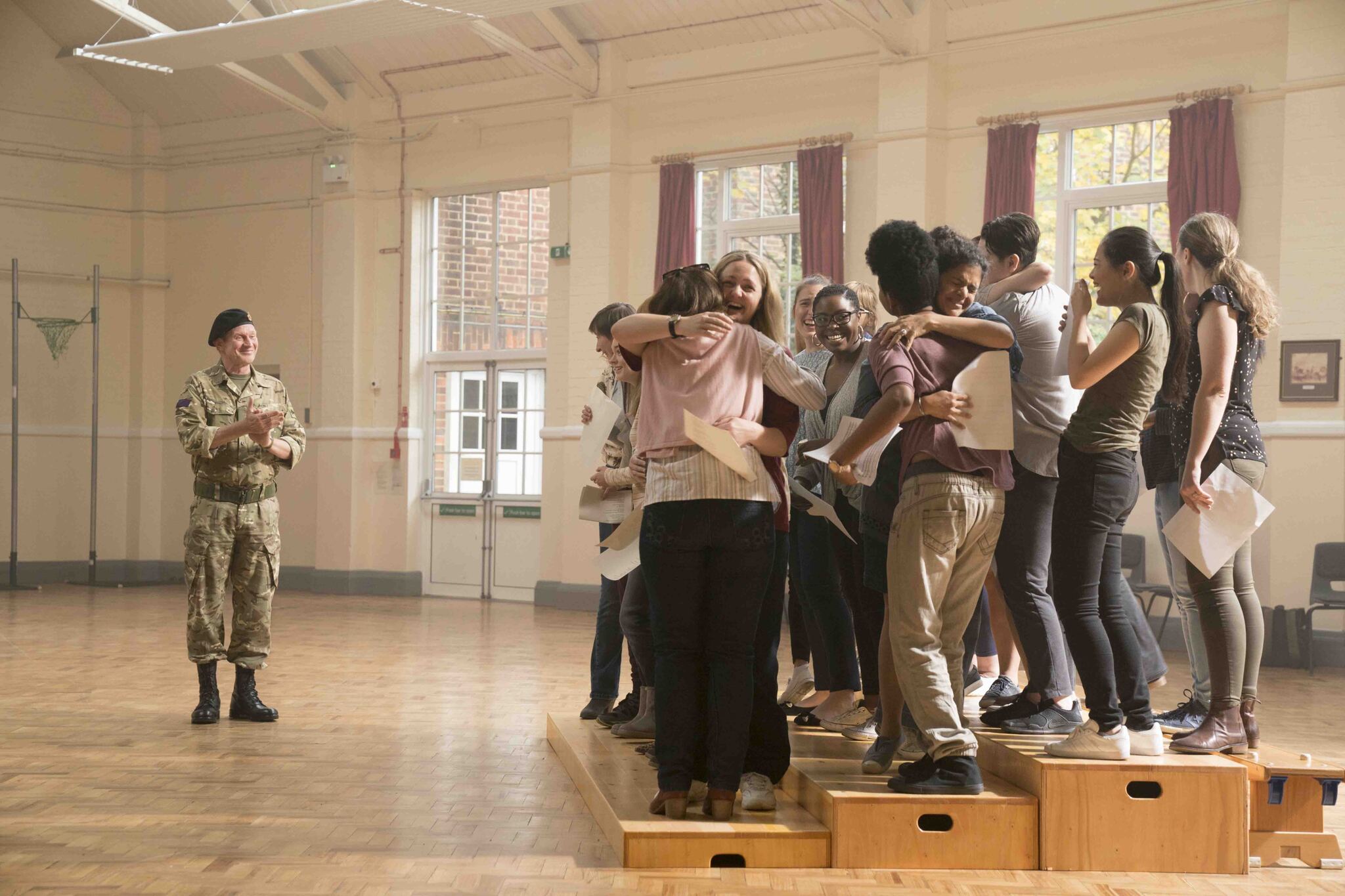Could joining a choir boost your mental health? These real-life Military Wives think so
We talked to the real Military Wives


The new heart-warming film Military Wives tells the story of two women who bond over the shared experience of having a partner fighting the war in Afghanistan.
We talk to two women who underwent similar trials in 2019 to find out what their daily lives are really like...
Military Wives is available on Friday 26 March (tomorrow!) to rent from the comfort of your own home.
Emma Watling, 46, lives in Norfolk and has been part of the Military Wives Choirs in Marham for more than six years
My average day is similar to everyone else’s if my husband is home. But when he’s away, it’s all about waiting – waiting for him to come home, waiting for a phone call or waiting for news. There’s a lot of not knowing, and we never look too far ahead. Because of that, we cherish every moment and try not to overthink saying goodbye – it’s more about saying hello again.
My family are my support network. However, when I joined the choir, I’d lost all my confidence. I’d had a baby prematurely, so I spent a lot of time at home with an unwell child and I was struggling. My husband encouraged me to join and it was my opportunity to do something for me. Now I go out once a week and I’m Emma, not Mum.
It has been a real journey – I’ve gone from the woman who wouldn’t say boo to a goose to choir lead. I walked through the door convinced I couldn’t sing, but choir is more than that. I know I don’t ever have to explain myself to the women around me, how or why I’m feeling, they just get it. Now I’m on the committee, I support 35 women to the best of my ability and have a team of eight who support them with me. I can call on those women at any time and they can call on me.
Sign up to our free daily email for the latest royal and entertainment news, interesting opinion, expert advice on styling and beauty trends, and no-nonsense guides to the health and wellness questions you want answered.
For example, I find it difficult that I’m essentially a single parent some of the time, but I’m not. If I have to make a decision, it’s hard. Being part of a choir means that we talk about these things and you get different ideas about ways to support your children. I’ve also made friends with women I wouldn’t necessarily have met. One of my closest friends is a woman who doesn’t have young children, so I never would have met her in the playground, and she doesn’t live on camp.
I think of choir much like my work at a night shelter for homeless people – some assume that I give a lot but I gain far more than I give. Being in the choir has become a huge part of my life and I can’t imagine I’d be without it now.
Jane Batchelor, 51, lives in North Devon and joined the Chivenor Military Ladies Choir nine years ago
My husband was in the RAF Search and Rescue when we got married in 1999. We bought a house in Devon and had just moved in when he was sent to Suffolk. He spent the next 12 years commuting to posts in the UK and overseas. He had colleagues based at 22Sqn, RMB Chivenor so my friends were his friends. When our two sons came along, my friends were parents of other children, so I was always somebody’s mum or somebody’s wife.
Although we could talk on the phone every night, it was difficult when he went away for more than a couple of weeks. When you have children growing up, their needs change, so he’d come back and things would be different. Plus, his job included being called to situations such as sinking fishing boats or aircraft crashes, so I would worry when he was on a shift on a stormy night.
In 2011, I read that the Military Wives Choir was putting on a concert at the Pannier Market, so I went along. A lot of my husband’s friends’ wives were in the choir and they encouraged me to join – it was the best thing I could have done. We rehearsed three times a week with Gareth Malone, and TV cameras recorded our rehearsals for months. Then the Royal Albert Hall Festival of Remembrance performance happened, which was a highlight.
However, being in the choir is more than concerts and experiences. When I first joined, there was no way I would have sung solo but now I do, and I am more confident. It has given me my own identity and a support network. The women of the choir have become friends for life, and I know that I can rely on them.
Follow on Facebook and Instagram @chivenormilitaryladieschoir
So why is singing so good for our mental health?
We spoke to an expert, clinical psychologist and founder of HarmonyChoir, Liesbeth Tip, to get her insight...
Can you tell us why mental health can be positively impacted by singing?
There are both biological mechanisms as well as psychological processes that are beneficial for choir singers. Oxytocin, the 'cuddle hormone' increases when choir singing. It can also affect cortisol which is involved in stress responses.
When the choir sings their repertoire, the songs in itself can be perceived as beautiful, the sound the choir makes together can be moving or uplifting, and people can channel their emotions through song, for example when the lyrics have meaning to them, or just because the sound represents a certain mood. When singers learn new repertoire that can be challenging at first, but it can improve self-esteem because achieving that gives a sense of 'mastery', and people can be proud they managed to learn a new song and produce a beautiful sound together.
Choir singers bond together because of their shared task and goals, it really is team work to sing together, and especially when you perform together. This together with the frequency that people meet (usually weekly) promotes a sense of community and belonging, which is more and more recognised as important to well-being and mental health. Choir singers identify with the choir as their community.
How can singing help us through hard times?
As choirs are such a community, people have different roles in the choir and in the community. As a choir is aimed at doing things together it is team work, and every individual contributes to the main goal, making a beautiful sound. I believe that the fact that people are also equal in the sense that you need everyone in the choir to make a good sound, helps in people accepting each other. You can see that back in the movie, where everybody has their own part to play, and together you can achieve more, collectively, than when it's individuals on their own.
I think it is the acceptance, the regularity that people meet, and the fact that choir singing can lift you out of your worries even if it is just for the duration of the rehearsal, can help getting someone through hard times. In addition, you have the breathing that in itself can be relaxing or freeing, and the other neurobiological processes that can impact on mood and anxiety.
Also, people can feel less alone when they are part of a choir. You get to know each other quite well as singing can stir up all kinds of emotions, and I think that may make it easier for people to talk to others or check in with them than in general.
How valuable is taking part in an activity like a choir for maintaining good mental health?
It is important that choir singing suits you to start with of course, as people have different preferences, not everybody will like it but there is a huge amount of research done that all kinds of (social) activities are good for mental health so people should just try out and see what fits.
I would recommend not thinking that you can't sing, as a lot of it has to do with singing techniques, which is about muscles, and you can learn to use your muscles in certain ways, it is just most of the times people haven't tried it. A good vocal coach is worth it in this respect!
Lauren is the former Deputy Digital Editor at woman&home and became a journalist mainly because she enjoys being nosy. With a background in features journalism, Lauren worked on the woman&home brand for four years before going freelance. Before woman&home Lauren worked across a variety of women's lifestyle titles, including GoodTo, Woman's Own, and Woman magazine.
